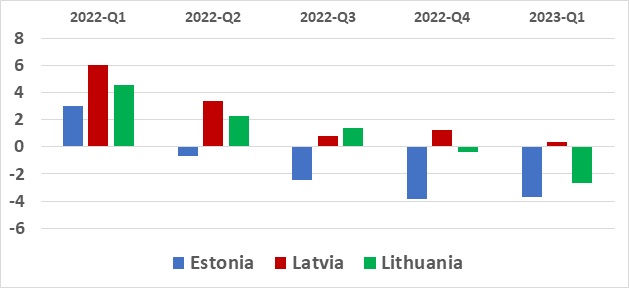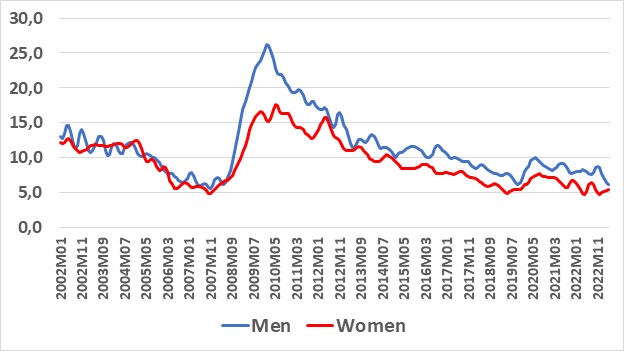During a recent Executive Education course at SSE Riga I had this interesting question: What is the difference between a recession and an economic crisis? The former is typically defined as a decrease in GDP for at least two quarters in a row – this puts Estonia and Lithuania into this category, see Figure 1. The Lithuanian economy has been contracting for the past two quarters whereas Estonia’s recession so far has lasted a year.
Latvia’s economy is still reporting growth albeit at very low rates (perhaps RailBaltica made the difference between Latvia and its two Baltic neighbours?); in 2023 Q1 the economy essentially was at a standstill.
An economic crisis does not have a similarly clear definition – this one, for instance, is not very helpful – what exactly is a “significant deterioration of the economy”???
Figure 1: Economic growth in the Baltics, annualized, 2022-Q1 – 2023-Q1

Source: Eurostat
The recessions/slowdowns are pretty easy to explain: 1) High inflation has eroded purchasing power for just about everyone, 2) Higher interest rates reduce lending and lending-related activities and also dents purchasing power for those with loans, 3) general uncertainty relating to Russia’s war in Ukraine holds back some investment and 4) less trade with Russia due to sanctions
But I think very few would think of the current state of the Baltic economies as facing an economic crisis. Unemployment (I chose to show this for just Latvia, see Figure 2) is still at historically very low levels – in April the unemployment rate was 6.1% for men, its lowest level since December 2007. The rate for women, 5.4%, was marginally lower on a couple of occasions in mid-2019 and in 2022 but otherwise also at a historically very low level.
From a macroeconomic point of view, we might even argue that the current slowdown is welcome as it eases an otherwise quite hot labour market.
Figure 2: Unemployment rates for men and women, Latvia, 2002-I – 2023-IV

Source: Statistics Latvia, stat.gov.lv
So, the main lesson here is the importance of a balanced economy (in terms of growth, unemployment, inflation etc.) when an economic shock happens.
2008 – 2010 was not only a time of recession, it was definitely a time of economic crisis, too. Let us be very happy that the timing of Covid-19 or Russia’s invasion of Ukraine was not 2008 – 2010. That would have taken an economic crisis towards economic disaster.
Whereas these two events were seriously unwelcome, the economy was ready for them and the fallout is thus limited. Many thanks for that!
Morten Hansen is Head of the Economics Department at Stockholm School of Economics in Riga






Komentāri (1)
Jānis Lakijs 20.06.2023. 07.54
Jauki, protams, ka žurnāla IR auditora prot jauno krievu (tas ir, angļu) valodu, bet tikpat vērtīgas mūsdienu “latviešu inteliģencei” un “māksliniekiem” varbūt būtu arī latviešu valodas zināšanas un prasme kaut ko jēdzīgu uzgleznot. Piemēram, ne tā, kā uz šīm Dziesmu svētkiem veltītajām Latvijas Pasta pastmarkām
https://kultura.riga.lv/lv/kultura?target=news_item&news_item=aicina-apmeklet-izstadi-pastmarka-latvijas-tels-artas-ozolas-jaunarajas-versijas-11268
0